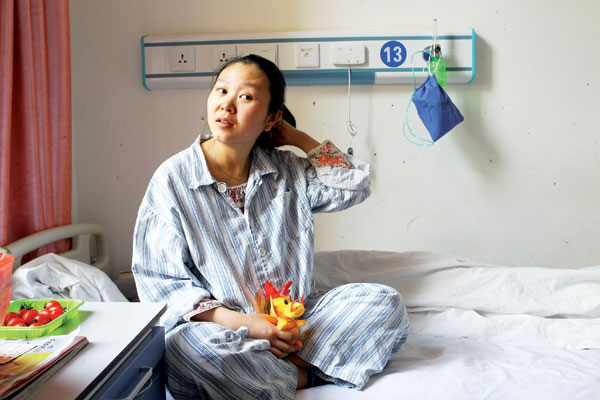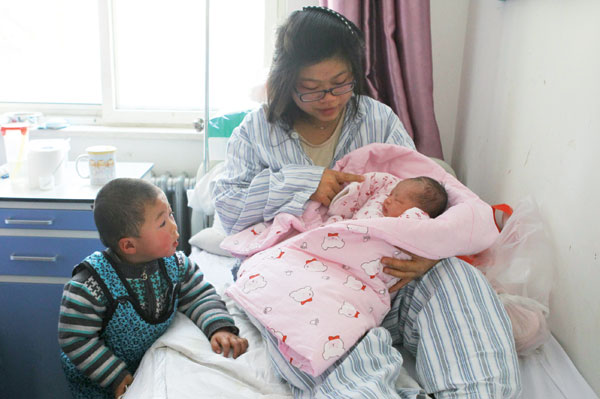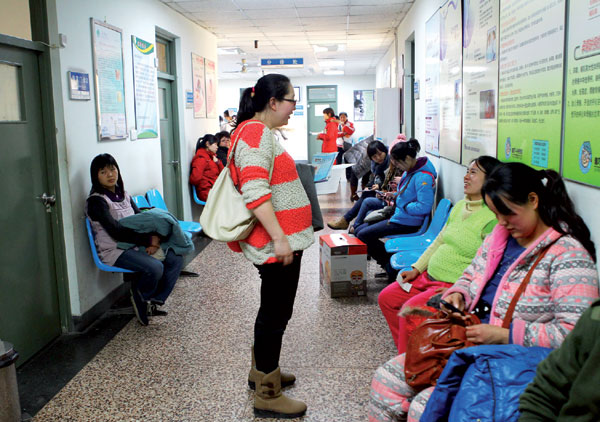Enter the dragon babies
Updated: 2012-02-01 07:54
By Cheng Anqi (China Daily)
|
|||||||||||
|
Liao Jie, 27, gave birth to her second baby just a few days before Spring Festival. Liao says she doesn't regret having a rabbit girl. Photos by Zou Hong / China Daily |
|
 Li Yan hopes her baby will take on the characteristics of the dragon - such traits as ambition and power. |
|
Women wait for prenatal appointments outside the obstetrics and gynecology clinic at a Beijing hospital. |
A boom in births accompanies the Year of the Dragon's arrival - as do shortages created by the surge. Cheng Anqi reports.
Li Yan had taken a bed in the obstetrics and gynecology department of the First Affiliated Hospital of Tsinghua University in Beijing - almost two months ahead of the due date. "I feel tense and my belly feels tight," the 26-year-old said in mid-January.
Her doctor told her the sensations were caused by uterine contractions that might signal a premature birth.
Li's family had persuaded her to stay in hospital and thereby get the best treatment to prevent her child being born premature and instead go to full term and be born in the Year of the Dragon - the most auspicious year of the Chinese zodiac, something the 26-year-old ethnic Korean from Jilin province deeply believes in.
"If my baby is born before Spring Festival, she'll be a rabbit," the mother-to-be says.
"Rabbits burrow holes in the ground, so they dislike the spotlight and are considered cautious, while the dragon flies thousands of miles, overlooking everything on Earth."
China is bracing for a baby boom as couples look forward to new additions to their family.
They hope their children will take on the characteristics of the Chinese zodiac's fifth creature - such traits as ambition and power. Traditional beliefs say dragons prefer to live by their own rules and are successful if left to their own devices.
Li often consults online versions of the Taoist I-Ching (Book of Changes) to select an auspicious name to bring her baby good fortune, although she believes actions will do more to determine her child's fate.
All of the department's 35 beds are full of mothers-to-be, ranging in age from 17 to 45. The eldest is about to have her second child.
More than 140 pregnant women undergo prenatal examinations at the clinic every day.
Wang Yan is 35 weeks pregnant and due to give birth in late February, the second month of the lunar year.
"My baby will enjoy high status and success if born this month, according to Chinese folklore," the 29-year-old says, while listening to her baby's heartbeat on the fetal monitor.
Obstetrics and gynecology department director Xia Yingli, who has worked at the hospital for 30 years, is all too aware of how beliefs surrounding the zodiac affect birth rates.
More than 36 million "millennium babies" were born in 2000 - the last Year of the Dragon. That's twice as many as in 1999 and 2001.
The birth rate dropped by 35 percent in 2003, the Year of the Ram, as many Chinese believe children born in this year are overly cautious and indecisive, which decreases their chances for success in life.
Four years later, the Year of the Golden Pig - the zodiac creature aligned with the most auspicious of Chinese geomancy's five elements in 2008 - brought another boom. More than 7,000 babies were born in the hospital that year, Xia recalls.
But this year will likely see more children than the Year of the Golden Pig, which will put pressure on hospitals and infant-related industries.
Hao Yanhong's baby is due to arrive on July 10, but she's already having trouble booking a bed at a hospital near her home.
"I tried three other hospitals, but all the beds were booked," the 32-year-old says.
Hao says she didn't do anything over the Spring Festival but try to reserve a bed for her birth.
Many hospitals were overburdened with prenatal appointments at the end of 2011. The Beijing Obstetrics and Gynecology Hospital moved antenatal care appointments from 13 to seven weeks of pregnancy.
The city's 35 tertiary referral hospitals are operating at 110 percent optimal capacity, and an estimated 200,000 babies will be born in Beijing this year, the municipal health bureau reports.
But the increase in Beijing births isn't solely because of observances of Chinese astrology.
"It's partly because of the growth of migrant populations," Peking University sociology professor Lu Jiehua says.
About 100,000 of the 190,000 babies born in the capital last year didn't have Beijing residency.
And China's baby boomers, who were born in the 1970s and '80s, are around 30 years old, which many consider the ideal age to become parents.
"Women born in the 1970s want to have their babies before they become too old," Lu says.
He explains a growing number of women from outside Beijing are marrying men from the capital.
"Then, the baby can enjoy Beijing residency," Lu says.
The effects of the surge in births have already materialized nationwide.
The Guangdong Provincial Population and Family Planning Commission's director Zhang Feng says the boom of recent years will produce 4.6 million bachelors by 2020 and result in a severe sex-ratio imbalance.
This year's increase in births is likely to lead to a boom in the childcare industry, too.
Chongqing municipality is facing a marked shortage of licensed healthcare workers. Many expectant parents must book a "maternity nanny" to care for pregnant mothers well in advance, which has caused a wage hike for nannies.
Nearly all of the city's highly qualified nannies are booked through July, Chongqing Daily reports.
Their monthly salaries are set to increase by 10 percent from 4,800 yuan ($760) last month to 6,000 yuan in June.
And products for infants have skyrocketed, with disposable diapers increasing from 130 yuan to 180 yuan a pack.
Decent baby clothes have increased to 200 yuan a set - twice last year's cost.
And the education system will also likely experience strain.
Liu Wei, headmaster of Nanyang No 9 Primary School in Henan province, recalls the school dealt with an explosion of new students in 2006, when dragon babies born in 2000 reached school age.
The school's seven classes overflowed to 130 students a class.
"We had to build a row of makeshift shacks to accommodate the sudden surge," Liu says.
"The large number of births will create shortages for babies who come into the world this year, from the time they're born until they look for jobs."
Today's Top News
Rescuers race against time for quake victims
Telecom workers restore links
Coal mine blast kills 18 in Jilin
Intl scholarship puts China on the map
More bird flu patients discharged
Gold loses sheen, but still a safe bet
US 'turns blind eye to human rights'
Telecom workers restore links
Hot Topics
Lunar probe , China growth forecasts, Emission rules get tougher, China seen through 'colored lens', International board,
Editor's Picks

|

|

|

|

|

|







